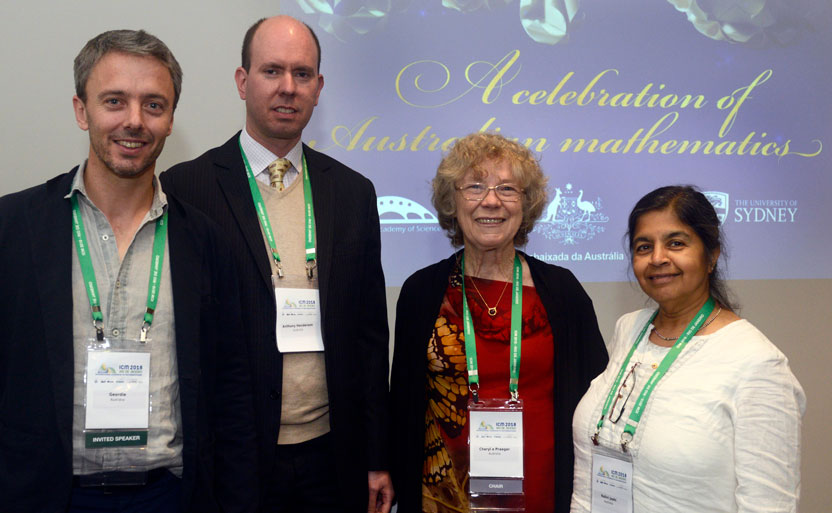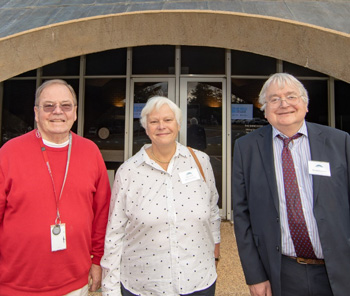Academy Fellow Professor Nalini Joshi was announced as Vice-President of the International Mathematical Union following her election recently at the IMU general assembly in Brazil. Professor Joshi is a strong champion of increasing the participation of women and minority groups in science and mathematics, including the Science in Australia Gender Equity (SAGE) initiative.
The general assembly was part of the International Congress of Mathematicians, which for the first time in its 121 year history was held in the Southern Hemisphere. During the congress, the Academy hosted a special Australian reception attended by more than 100 people, including the Australian Chargé d’Affaires in Brazil, Mr Peter Doyle; past, present and future IMU presidents; and many congress participants from Asia–Pacific nations.

Applications are now open for the Australia–India Strategic Research Fund (AISRF) Early- and Mid-Career Researcher (EMCR) Fellowships 2019.
The EMCR Fellowships provide support of up to $16,500 for Australian researchers to travel to India and work with leading researchers at major Indian science and technology organisations for a period of between one and three months. Applicants should propose a collaborative research project or a specific activity that has been developed in consultation with the host organisation(s) in India. The EMCR Fellowships are a component of the AISRF, a platform for bilateral collaboration in science jointly managed and funded by the governments of Australia and India.
The deadline for applications is 9am (AEST) Wednesday 12 September 2018. More information on these fellowships
The third Falling Walls Lab Australia will take place on 11 September 2018 at the Shine Dome in Canberra, hosted by the Academy in partnership with the Embassy of Germany in Canberra and the German–Australian Chamber for Industry and Commerce.
Falling Walls Lab Australia is an inspiring innovation forum for 20 young Australian researchers, social scientists, academics, entrepreneurs and professionals across all disciplines. The Lab provides a platform for each participant to present their research work, business model, innovative project, social initiative or idea in just 3 minutes on stage, in front of peers and a distinguished audience from academia and business.
This event is open to the public and entry is free. However, we recommend that you book early as seats are limited and will fill quickly. Please book your seat by Friday 31 August 2018.
The Australia–Americas PhD Research Internship Program supports the Australian Government’s National Strategy for International Education 2025. It is funded by the Australian Government’s Enabling Growth and Innovation Fund and administered by both the Australian Embassy in Washington DC and the Academy.
This year, through placements of 8–10 weeks in Australian research organisations, American second- and third-year postgraduate research scholars in education, science and engineering built collaborative partnerships and fostered ongoing collaboration.
The placements from June to August started with a two-day orientation program in Canberra, which provided an opportunity for the US and Latin American participants to meet. The placements concluded recently with a one-day session where each of the 40 scholars shared glimpses of their time here; spoke about their struggles and achievements and what they learned in their time in Australia; and identified what they were taking back with them to either Argentina, Brazil, Colombia or the USA.
The wrap up was also attended by representatives of the Department of Education and Training and the Department of Foreign Affairs and Trade. Dr Matthew Woolley from UNSW shared his experience as a host for a Colombian poarticipant, and Mr Justin Withers from the Australian Research Council presented opportunities for the students for future collaborations. Participants were then presented with a completion certificate.
The Academy is pleased at the success of the program and looks forward to supporting future collaborative opportunities between participating nations.


The Royal Society’s Foreign Secretary, Professor Richard Catlow, recently met with Fellows of the Academy in Sydney and Canberra who are also Fellows of the Royal Society. They explored how the two organisations could promote scientific collaborations between Australia and the UK as well as across the Commonwealth.
About 80 Australian researchers are Fellows of the Royal Society, the second largest number of overseas Fellows after the United States.
© 2026 Australian Academy of Science